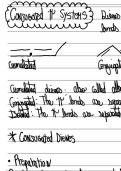Conjugated pi - Study guides, Class notes & Summaries
Looking for the best study guides, study notes and summaries about Conjugated pi? On this page you'll find 57 study documents about Conjugated pi.
Page 4 out of 57 results
Sort by
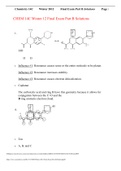
-
CHEM 14C Winter 12 Final Exam Part B Solutions,100% CORRECT
- Exam (elaborations) • 9 pages • 2023
-
- $14.99
- + learn more
CHEM 14C Winter 12 Final Exam Part B Solutions 1. HO O O 2. Influence #1: Resonance causes some or the entire molecule to be planar. Influence #2: Resonance increases stability. Influence #3: Resonance causes electron delocalization. 3. Coplanar The carboxylic acid and ring B have this geometry because it allows for conjugation between the C=O and the B ring aromatic electron cloud. H 4. 5. Ten 6. A, B, and C 7. Of the carbon stereocent...
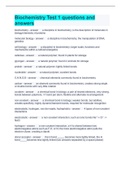
-
Biochemistry Test 1 questions and answers
- Exam (elaborations) • 12 pages • 2023
-
Available in package deal
-
- $19.49
- + learn more
Biochemistry Test 1 questions and answers biochemistry a discipline in biochemistry; is the description of molecules in biology/chemistry of proteins molecular biology a discipline in biochemistry; the manipulation of DNA, genetics cell biology a discipline in biochemistry; larger scale, functions and mechanisms within a cell/cell energetics cellulose a natural polymer; found in plants for storage glycogen a natural polymer; found in animals for storage p...
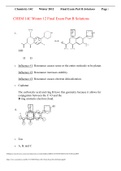
-
CHEM 14C Winter 12 Final Exam Part B Solutions,100% CORRECT
- Exam (elaborations) • 9 pages • 2023
-
- $13.99
- + learn more
CHEM 14C Winter 12 Final Exam Part B Solutions 1. HO O O 2. Influence #1: Resonance causes some or the entire molecule to be planar. Influence #2: Resonance increases stability. Influence #3: Resonance causes electron delocalization. 3. Coplanar The carboxylic acid and ring B have this geometry because it allows for conjugation between the C=O and the B ring aromatic electron cloud. H 4. 5. Ten 6. A, B, and C 7. Of the carbon stereocent...
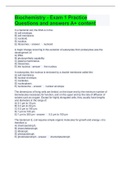
-
Biochemistry - Exam 1 Practice Questions and answers A+ content
- Exam (elaborations) • 10 pages • 2023
-
Available in package deal
-
- $18.49
- + learn more
In a bacterial cell, the DNA is in the: A) cell envelope. B) cell membrane. C) nucleoid. D) nucleus. E) ribosomes. nucleoid A major change occurring in the evolution of eukaryotes from prokaryotes was the development of: A) DNA. B) photosynthetic capability. C) plasma membranes. D) ribosomes. E) the nucleus the nucleus In eukaryotes, the nucleus is enclosed by a double membrane called the: A) cell membrane. B) nuclear envelope. C) nucleolus. D) nucleoplasm. E) nucl...
This document contains an overview of conjugated pi systems.
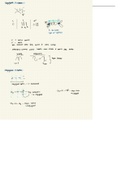
-
Organic Chemistry: Conjugated Pi Systems
- Class notes • 10 pages • 2022
- Available in package deal
-
- $5.49
- + learn more
This document contains digitally taken, handwritten notes for the conjugated pi systems chapter. It covers topics on HOMO and LUMO structures, energy levels as well as molecule stability. Notes also cover information dienes, their nomenclature as well as their properties. Thoroughly explained subtopics include 1,2 and 1,4 addition, pericyclic reactions, Diel’s - Alder reaction as well as sigmatropic, Cope and Cleissen rearrangements. Notes show mechanism thoroughly and include explanation as n...
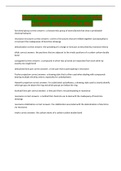
-
Klein Organic Chemistry Chapter 2 With Complete Solution Q & A 2023
- Exam (elaborations) • 1 pages • 2023
-
Available in package deal
-
- $4.99
- + learn more
Klein Organic Chemistry Chapter 2 With Complete Solution Q & A 2023 functional group correct answers a characteristic group of atoms/bonds that show a predictable chemical behavior resonance structures correct answers a series of structures that are melded together (conceptually) to circumvent the inadequacies of bond-line drawings delocalization correct answers the spreading of a charge or lone pair as described by resonance theory allylic correct answers the positions that are ...
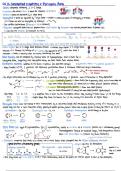
-
Conjugated pi systems and pericyclic reactions
- Class notes • 2 pages • 2024
- Available in package deal
-
- $7.99
- + learn more
Discusses how conjugation works, and how it affects stability and reactivity of a molecule. Includes information about nomenclature, and shows how pericyclic reactions work, including their mechanisms. The diels alder reaction is focused on.
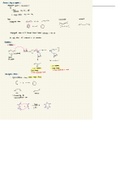
-
Organic Chemistry 2: Conjugated Pi Systems Summary
- Summary • 2 pages • 2022
- Available in package deal
-
- $5.49
- + learn more
This document is a summary of the conjugated pi systems chapter of the organic chemistry 2 course. It is digitally taken, handwritten notes. It covers topics on HOMO and LUMO structures, energy levels as well as molecule stability. Notes also cover information dienes, their nomenclature as well as their properties. Thoroughly explained subtopics include 1,2 and 1,4 addition, pericyclic reactions, Diel’s - Alder reaction as well as sigmatropic, Cope and Cleissen rearrangements. Notes show mecha...
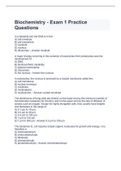
-
Biochemistry - Exam 1 Practice Questions and Answers 2022
- Exam (elaborations) • 10 pages • 2022
-
Available in package deal
-
- $13.99
- + learn more
In a bacterial cell, the DNA is in the: A) cell envelope. B) cell membrane. C) nucleoid. D) nucleus. E) ribosomes. nucleoid A major change occurring in the evolution of eukaryotes from prokaryotes was the development of: A) DNA. B) photosynthetic capability. C) plasma membranes. D) ribosomes. E) the nucleus the nucleus 00:34 01:10 In eukaryotes, the nucleus is enclosed by a double membrane called the: A) cell membrane. B) nuclear envelope. C) nucleolus. D) nuc...

How did he do that? By selling his study resources on Stuvia. Try it yourself! Discover all about earning on Stuvia

